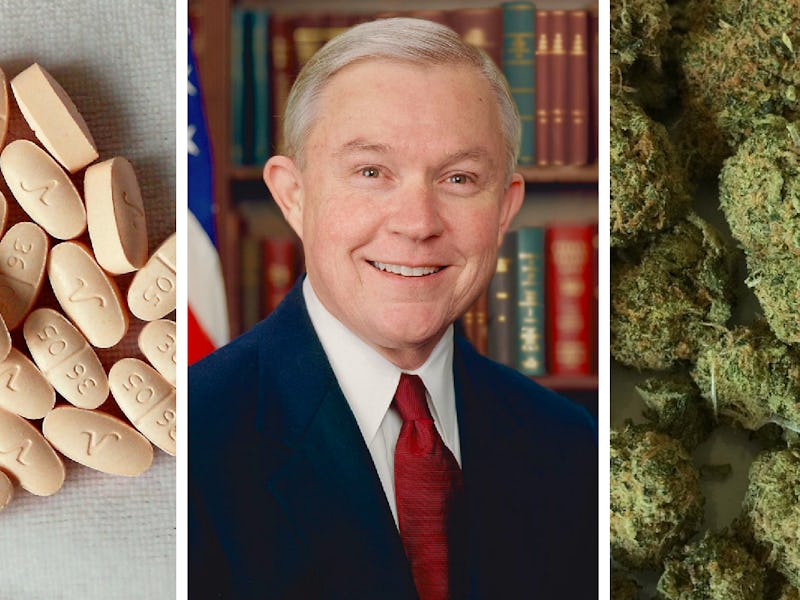On Wednesday, Attorney General Jeff Sessions cemented his place as a fighter of the “war on drugs” when he delivered a speech on violence, crime, and public safety and called marijuana only “slightly less awful than heroin.”
After arguing that the best ways to treat the “scourge of drugs” are criminal enforcement, treatment, and prevention, Sessions pointed to pot as a gateway drug to serious vices (despite vast scientific research to the contrary):
“I realize that this may be unfashionable in a time of growing tolerance of drug use. But too many lives are at stake to worry about being fashionable. I reject the idea that America will be a better place if marijuana is sold in every corner store. And I am astonished to hear people suggest that we can solve our heroin crisis by legalizing marijuana — so people can trade one life-wrecking dependency for another that’s only slightly less awful. Our nation needs to say clearly once again that using drugs will destroy your life.”
There’s a lot to unpack there. Let’s start with the claim that marijuana is only slightly less awful than heroin. In his statement, Sessions measures drug impact by the number of overdose deaths. Marijuana and opioids (including legal opioid prescriptions and heroin) are vastly different: According to the American Society of Addiction Medicine, an estimated 20,101 Americans overdosed from prescription opioid painkillers in 2015 alone. In the same year, 12,999 Americans died because of heroin overdose. While marijuana has instigated behavior that has led to fatalities, such as driving while high, there is no credible scientific evidence that it has ever led to an overdose death.
Furthermore, studies have found that states with legalized medical cannabis have significantly lower state-level opioid overdose mortality rates. In a JAMA published analysis of country-wide data pulled from 1999 to 2010, researchers found that states with medical cannabis laws had 24.8 percent fewer opioid deaths than those that penalized marijuana consumption. In states with pot-friendly laws, people had the opportunity to treat their pain with marijuana rather than opioid prescriptions. A growing number of researchers believe that because marijuana also acts as a painkiller, it can serve as a credible way to treat both opioid and heroin addictions. That’s the very scenario that Sessions describes with disbelief.
Attorney General Jeff Sessions believes marijuana is only "slightly" less worse than heroin.
The most scientific invalid point of Sessions’s speech is his belief that marijuana acts a gateway drug to heroin — a claim that Sean Spicer has made as well. Since 1999, the National Academy of Sciences’ Institute of Medicine has found no proof that marijuana can be linked to the subsequent use and abuse of other drugs. A 2016 review specifically examined a decade worth of research on the association between cannabis use and the subsequent use of opioids found that there simply was no way that marijuana was considered a gateway drug.
Sessions, however, prefers to ignore credible science and reminisce about the “campaigns” of the 1980s and the 1990s, which, might we remind him, are the same campaigns that systematically targeted minority populations and resulted in the number of people arrested for nonviolent drug charges growing from 50,000 in 1980 to 400,000 in 1997.
